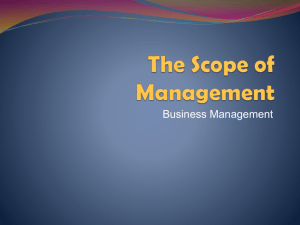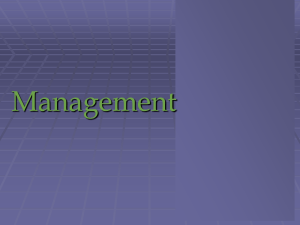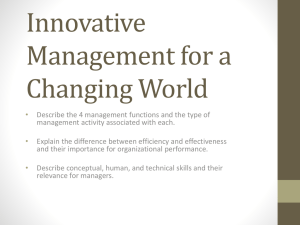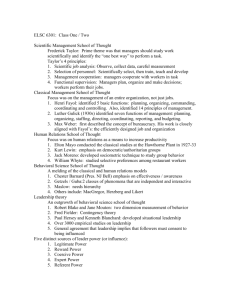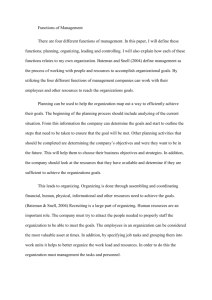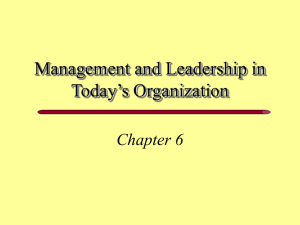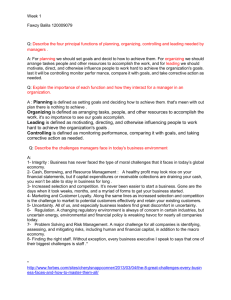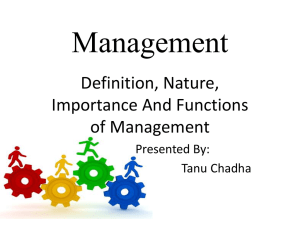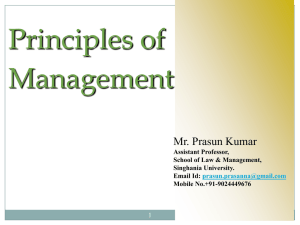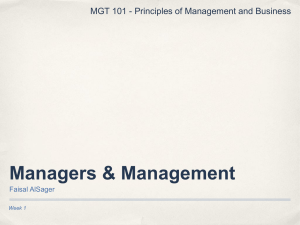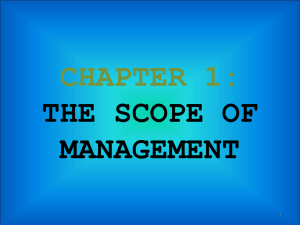Management Practices
advertisement
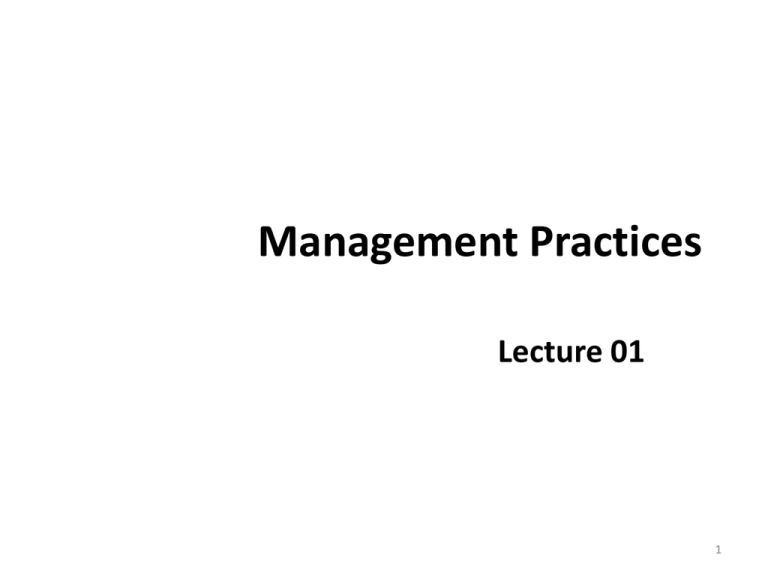
Management Practices Lecture 01 1 Introduction Dr. M. Shakil Ahmad – PhD Business Management • Universiti Teknologi Malaysia, Malaysia – MS (Management) • COMSATS Institute of IT, Abbottabad 2 Course Contents Managers and Managing. The Evolution of Management Theory. The Organizational Environment. The Global Environment. Ethics, Social Responsibility, and Diversity. The Manager as a Decision Maker. The Manager as a Planner and Strategist. Managing Organizational Structure. Organizational Control and Culture. Building Human Resources. The Manager as a Person. Motivation. 3 Course Contents Leadership Groups and Teams Communication Organizational Conflict, Politics, and Change Managing Information Systems and Technologies Operations Management: Managing Quality, Efficiency, and Responsiveness to Customer The Management of Innovation, Product Development, and Entrepreneurship 4 5 Gareth R. Jones Jennifer M. George Charles W. L. Hill 6 Management Key Concepts • Organizations: People working together and coordinating their actions to achieve specific goals. • Goal: A desired future condition that the organization seeks to achieve. • Management: The process of using organizational resources to achieve the organization’s goals by... – Planning, Organizing, Leading, and Controlling 7 Additional Key Concepts • Resources are organizational assets and include: • People, • Machinery, • Raw materials, • Information, skills, • Financial capital. • Managers are the people responsible for supervising the use of an organization’s resources to meet its goals. 8 Achieving High Performance • Organizations must provide a good or service desired by its customers. – Chen One and Addidas manages his firm to provide quality products. – Physicians, nurses and health care administrators seek to provide healing from sickness. – McDonald’s restaurants provide burgers, fries and shakes that people want to buy. 9 Organizational Performance • Measures how efficiently and effectively managers use resources to satisfy customers and achieve goals. – – Efficiency: A measure of how well resources are used to achieve a goal. • Usually, managers must try to minimize the input of resources to attain the same goal. Effectiveness: A measure of the appropriateness of the goals chosen (are these the right goals?), and the degree to which they are achieved. • Organizations are more effective when managers choose the correct goals and then achieve them 10 Managerial Functions • Henri Fayol was the first to describe the four managerial functions when he was the CEO of a large mining company in the later 1800’s. • Fayol noted managers at all levels, operating in a for profit or not for profit organization, must perform each of the functions of: –Planning, –organizing, –leading, –controlling. 11 1-8 Four Functions of Management Planning Choose Goals Organizing Working together Controlling Monitor & measure Leading Coordinate Planning Planning is the process used by managers to identify and select appropriate goals and courses of action for an organization. 3 steps to good planning : 1. Which goals should be pursued? 2. How should the goal be attained? 3. How should resources be allocated? – The planning function determines how effective and efficient the organization is and determines the strategy of the organization 13 Organizing • In organizing, managers create the structure of working relationships between organizational members that best allows them to work together and achieve goals. • Managers will group people into departments according to the tasks performed. – Managers will also lay out lines of authority and responsibility for members. • An organizational structure is the outcome of organizing. This structure coordinates and motivates employees so that they work together to achieve goals. 14 Leading • In leading, managers determine direction, state a clear vision for employees to follow, and help employees understand the role they play in attaining goals. • Leadership involves a manager using power, influence, vision, persuasion, and communication skills. • The outcome of the leading function is a high level of motivation and commitment from employees to the organization. 15 Controlling • In controlling, managers evaluate how well the organization is achieving its goals and takes corrective action to improve performance. • Managers will monitor individuals, departments, and the organization to determine if desired performance has been reached. – Managers will also take action to increase performance as required. • The outcome of the controlling function is the accurate measurement of performance and regulation of efficiency and effectiveness. 16 Why to Study Management Practices? • The more efficient and effective use of scarce resources that organizations make of those resources, the greater the relative well-being and prosperity of people in that society 2. Helps people deal with their bosses and coworkers 3. Opens a path to a well-paying job and a satisfying career 17 Decisional Roles • Roles associated with methods managers use in planning strategy and utilizing resources – Entrepreneur—deciding which new projects or programs to initiate and to invest resources in. – Disturbance handler—managing an unexpected event or crisis. – Resource allocator—assigning resources between functions and divisions, setting the budgets of lower managers. – Negotiator—reaching agreements between other managers, unions, customers, or shareholders. 18 Summary • • • • Management Key Concepts Functions of Management Decisional Roles Why to Study Management Practices? 19 Next Lecture • • • • Management Levels Restructuring Management Trends Managerial Roles 1. Interpersonal 2. Informational 3. Decisional 20

